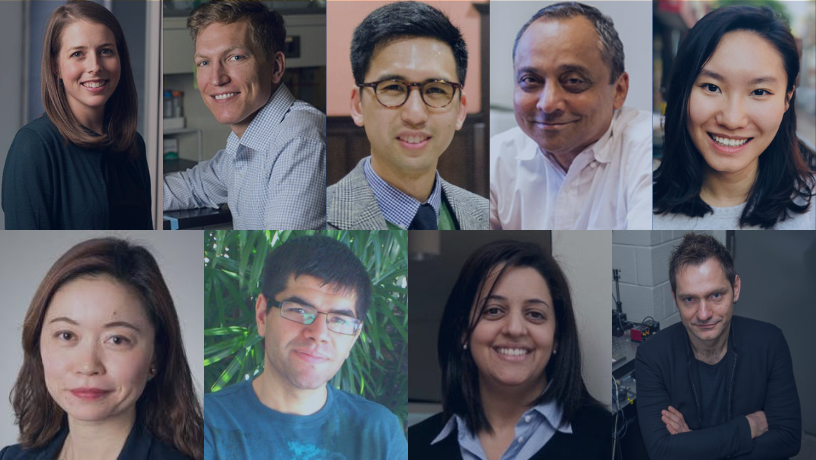Faculty Win Provost Office Grants for Teaching & Learning
New proposals will advance projects directed at AI, graduate teaching, and student-centered approaches to learning

Recipients of Provost Office Grants for Teaching & Learning from left to right, clockwise: Allie Obermeyer, Kyle Bishop, Christopher Chen, Hardeep Johar, Yipu Zheng, Sinisa Vukelic, Ansaf Salleb-Aouissi, Nakul Verma, and Shu-Yi Hsu.
Four proposals from Columbia Engineering faculty have won 2024 Teaching and Learning grants from the Office of the Provost for innovative projects related to Massive Open Online Courses, Large-Scale Teaching & Learning, and Innovative Course Design.
The Provost Office grants are awarded annually to enable faculty in their efforts to implement new educational methods and technologies in their classrooms. The Center for Teaching and Learning (CTL) provides the faculty recipients with logistical and instructional support. Specifically, faculty will receive access to in-kind services and resources from the CTL, including support for content development, instructional design, media production, assessment, and project management, as well as funding.
Read about the winning proposals:
Massive Open Online Course - Generative AI for Business
Team: Hardeep Johar, senior lecturer in the Department of Industrial Engineering and Operations Research; Shu-Yi Hsu, senior instructional designer at Columbia+; and Yipu Zheng, Instructional Technology & Media program, Teachers College
The team intends to build an AI teaching assistant for the IEOR 4526 Analytics on the Cloud course. The team will be using transcripts from recorded lectures, canvas course materials, Ed discussion discussions, and publicly available articles to train the teaching assistant. Funds from the grant will be used to assess the impact of the AI TA on student engagement and on learning outcomes and the potential of the AI TA to collaborate with the teaching team (including the instructor and human TAs).
Large-Scale Teaching & Learning - Implementing Standards, Assessment, and Support for Graduate Teaching in Chemical Engineering
Team: Allie Obermeyer, assistant professor of chemical engineering; Kyle Bishop, professor of chemical engineering; and Christopher Chen, lecturer in discipline in the Department of Chemical Engineering
The team’s project aims to revamp graduate training in the Department of Chemical Engineering, with an emphasis in improved training of graduate teaching assistants (TAs). As part of their project, they intend to update the expectations for the department’s doctoral student teaching, creating new training for the TAs, and providing support to TAs as instructors. By adopting these practices, the goal is to help establish the chemical engineering department as a school-wide and national example as to how to effectively train and support doctoral TAs who can then become effective instructors when they become faculty. Some of the changes proposed to the doctoral program includes decoupling first-year support from departmental TAships, to allow for students to better acclimate to Columbia and have more time to prepare for their teaching assignments and the restructuring of CHEN E6543 Chemical Engineering Research Methodologies into a course that both prepares students as graduate researchers, but also as graduate student instructors. This course will place an emphasis on DEI topics in teaching, learning, and research.
Provost Innovative Course Design - FOL Learner: An Online Feedback Tool for Practicing First Order Logic
Team: Ansaf Salleb-Aouissi and Nakul Verma, both senior lecturers in discipline in the Department of Computer Science
The proposal emphasizes the importance of critical thinking and quantitative reasoning skills for computer science students, which are developed through foundational courses like Discrete Mathematics. This course is essential for second- or third-year CS undergraduates; A critical part of the course is mastering logic, starting with Propositional Logic (PL) and advancing to the more expressive First Order Logic (FOL), which is crucial for proof writing. However, due to time constraints, students often struggle with FOL proficiency.
To address this, the team aims to develop an automated, gamified online platform to help students practice and master FOL. This system will complement traditional TA interactions and provide a judgment-free environment for students to build confidence and skills in FOL, facilitating their transition to proof techniques. Building on the success of an existing practice app, the proposed FOL Learner will offer auto generated FOL expressions and questions to help students in translating mathematical statements into FOL, thereby enhancing their preparation for advanced CS courses.
Provost Innovative Course Design - Introducing a Project to Promote Active Learning in Manufacturing
Team: Sinisa Vukelic, lecturer in discipline in the Department of Mechanical Engineering
The proposal is to redesign the MECE E3610 Materials and Processes in Manufacturing course. MECE E3610 Materials and Processes in Manufacturing is a required course taught in junior year and provides students with a background in materials science and teaches students about manufacturing processes. Under this grant, Vukelic will be redesigning the course to implement project based learning (PBL). This is a student-centered approach that promotes independent work, collaboration, and communication. The main characteristics of such an approach are the active involvement of students, context-specific learning, and knowledge acquired through sharing and social interactions. PBL has traditionally been utilized in engineering education, and many studies have assessed its effectiveness. In manufacturing education, PBL has helped reduce the gap between content presented in the classroom and what is practiced on the factory manufacturing floor. This proposed course redesign aims to combine the PBL with traditional classroom delivery, drawing from prior conclusions that PBL connects with other pedagogical approaches.
